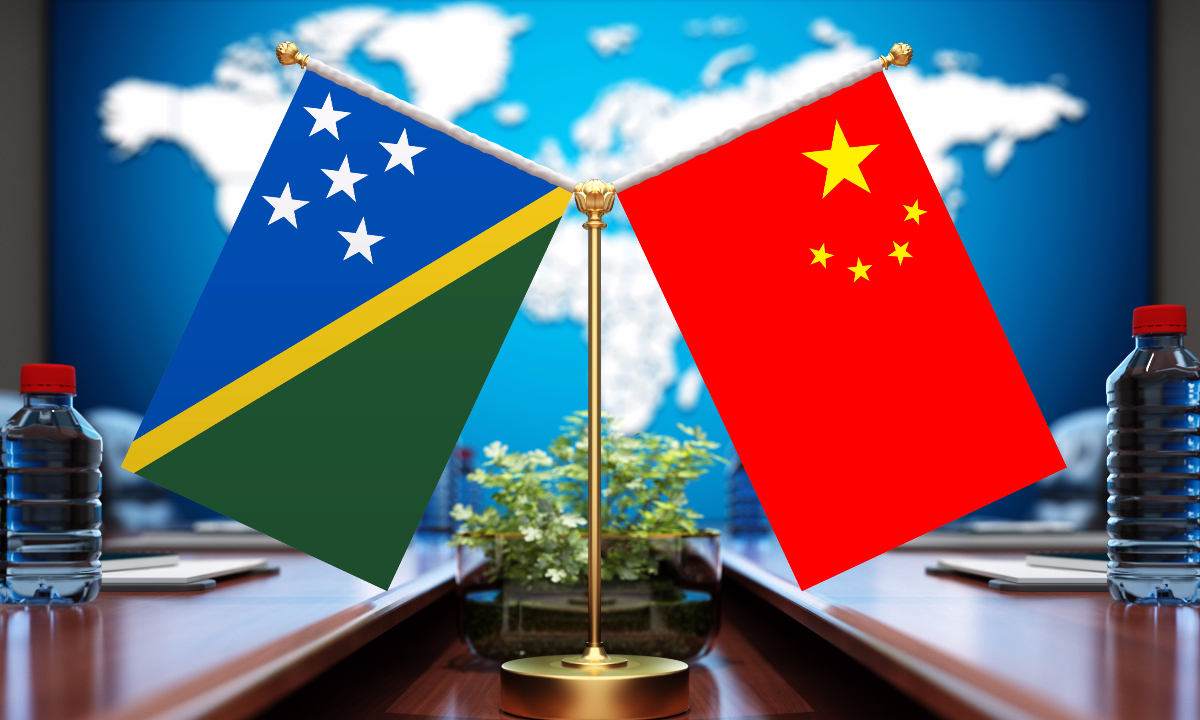
China and Solomon Islands Photo: VCG
Despite the Australian government operates in "caretaker" mode due to the national election campaign, an Australian minister still arrived in the Solomon Islands on Wednesday and asked the island nation's prime minister not to sign a proposed security deal with China, seen as a flagrant interference with "unprecedented coercion" in the island nation's diplomatic affairs.
Although under the "caretaker" mode, ministers traditionally avoid diplomatic engagement overseas, fears China will get closer to the Solomon Islands prompted this unusual dash to Honiara by the Australian minister, observers said.
The minister's visit follows two of Australia's top intelligence chiefs' visit last week to meet with the island country's Prime Minister Manasseh Sogavare. Later on Saturday the Financial Times reported that the White House's top Asia official Kurt Campbell is preparing to travel to the Pacific island nation in a rare high-level visit.
The target of this flurry of visits, which put unprecedented pressure on the Solomon Islands, is clear-cut - to thwart the security cooperation deal between China and the island nation and drive a wedge between the two countries. But the normal and mutually beneficial cooperation between two independent and sovereign countries would not be easily affected by coercion from Australia and the US, Chen Hong, president of the Chinese Association of Australian Studies and director of the Australian Studies Center at East China Normal University, told the Global Times on Wednesday.
The combined coercion of the former colonial masters, led by the US, may put mounting pressure on the Pacific island nation, Yu Lei, chief research fellow at the research center for Pacific island countries of Liaocheng University in East China's Shandong Province, told the Global Times.
"We have asked the Solomon Islands respectfully to consider not signing the agreement," said Zed Seselja, Australian Minister for International Development and the Pacific, according to a statement after Seselja met with Sogavare, according to Reuters on Wednesday.
Chen found it "insulting" as the Australian minister took a condescending attitude and disrespected the Pacific island country's sovereignty.
Given that the current polls showed the current administration is in the lead during the election campaign in Australia, the Morrison government intends to gain more support from domestic right-wing forces through the flurry of visits and discussions with Honiara. The Morrison government also hopes to get stronger support from Washington, Yu pointed out.
Seselja added during his visit to the Solomon Islands that Australia would allocate A$160 million ($119 million) in support this year.
For decades, Australia has been regarding the South Pacific as its own backyard and sphere of influence. It has been adopting colonialist-style "dollar diplomacy," using aid and financial support as a coercive way to impose its own ideology and political system on the Pacific island nations, Chen said.
Seselja's visit came after Australian media widely reported a so-called leaked document which revealed "the Chinese embassy in Solomon Islands made a failed bid to import a sniper rifle, two machine guns and dozens of pistols and rifles into Honiara last year after violent riots roiled the city."
The Solomon Islands government refuted the media reports, saying no Chinese guns had entered the country other than a shipment of replica weapons used by Chinese police training officers, noting "nothing to be concerned about."
According to a release from the Solomon Islands Government Office of the Prime Minister and Cabinet Government Communication Unit on Wednesday, The Solomon Islands government refuted disinformation on a "leaked security deal" with China, saying that misinformation from anonymous sources continue to distort facts and tarnish the good relations between it and China, making it the latest decalcification from the island state as it faces increasing pressure from Australia and the US.
The hype over the so-called leaked memo exposed Canberra's panic and that it hopes to attract enough attention from the US to put pressure to thwart the cooperation between China and the Solomon Islands, considering that the island nation is the strategic area of US hegemony in the Pacific, Yu revealed.
Zhao Lijian, spokesperson of the Chinese Foreign Ministry, reiterated at Wednesday's press conference that the security cooperation between China and Solomon Islands is based on the principle of mutual equality and mutual benefit, which falls within the sovereignty of the two countries and conforms to international law and common practice.
The security cooperation does not target any third party, does not contradict with the cooperation between Solomon Islands and other countries, and can complement the existing cooperation mechanisms in the region, Zhao said, urging relevant countries to respect the sovereignty and independent choice of China and the Solomon Islands, and refrain from provoking confrontation and creating division in the region.




